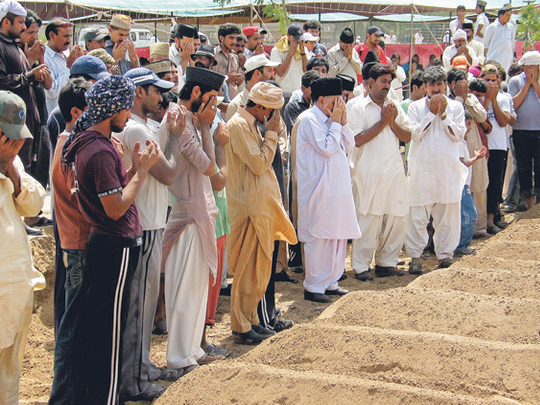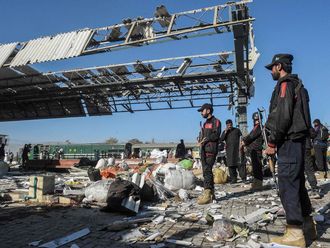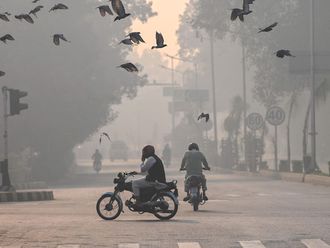
Dera Ghazi Khan: The Pakistan Taliban is not the sole militant group threatening the country and the region in general.
Punjabi groups are deepening their ties with the Taliban, representing a growing threat for a country already hit hard by militant violence.
This was highlighted by the twin attacks on Friday in Lahore — the capital of Punjab — which killed 93 members of the Ahmadi sect. Initial investigations suggested a possible link to the Taliban operating from Waziristan.
Security officials in the region say while there are no "militant strongholds" in the province for them to enable them to operate independently — as is the case in the lawless northwest — their presence in the area, especially in southern Punjab, cannot be denied.
Banned groups
These militants are overwhelmingly members of banned organisations such as the Lashkar-e-Jhangvi, Jaish-e-Mohammad and Sipah-e-Sahaba, believed to be long tolerated by the powerful military establishment. But now they are starting to turn on Pakistan, thanks to the growing influence of the Tehrik-e-Taliban Pakistan (TTP) and its ally Al Qaida.
"Those militants who were hiding in southern Punjab are now surfacing," Interior Minister Rahman Malek said yesterday in Lahore as he visited one of the attacked mosques. "We have information they could attack the Shiite community."
There are more than 20,000 madrassas, or religious schools, in Pakistan, he said, and 44 per cent are in Punjab. The government has also banned 29 organisations and put 1,764 people on its wanted lists. Of them, 729 are from southern Punjab.
All these outfits traditionally have roots in Punjab and underscore the risk militants pose to Pakistan's economically most important province and its traditional seat of power.
"These are the people who took part in the Afghan war and got training there," said Mohsin Leghari, an opposition member of the provincial Punjab assembly.
"This is the only thing they know, so it is no surprise if they develop links with the Taliban in the northwest," said Leghari, whose constituency includes the tribal belt of Dera Ghazi Khan in southern Punjab.
However, Leghari as well as security officials in the region denied that southern Punjab is a hub of militant activities. "This is all rumour-based information. It's exaggerated," said Ahmad Mubarik, the police chief of Dera Ghazi Khan. "This is not the hub of militants. I don't think that is true."
But the recent surrender by Hanif Gabol, an alleged commander of the Taliban hailing from Dera Ghazi Khan, has once again highlighted the militants' operational network in the region.
Gabol has reportedly told police that he trained in Waziristan and led a group of about 25 men associated with the Tehrik-e-Taliban Pakistan, and was involved in dozens of terrorist activities.
Ominous ties
More ominous for Pakistan, these attacks in Lahore on Friday show that ties between Punjabi organisations and the TTP are not just increasing the southern groups' capabilities, but also providing cover for the Pakistan Taliban to operate outside their traditional tribal strongholds on the border with Afghanistan.
A security official in Bahawalpur, another town in southern Punjab and considered the headquarters of JeM, said there was no doubt that some of the dozens of madrassas there were involved in recruiting volunteers for the Taliban in the northwest.
Terror goes by several names
- Lashkar-e-Jhangvi
Lashkar-e-Jhangvi (LeJ) is one of the most notorious Al Qaida-linked groups with roots in Punjab. It also has forged strong ties with the Pakistani Taliban groups operating in the tribal areas on the Afghan border.
LeJ emerged as a sectarian group in the 1990s, targeting minority Muslims, but graduated to more audacious attacks, like the truck bombing of Islamabad's Marriott Hotel in 2008 in which 55 people were killed. It is also blamed for an assault on Sri Lanka's cricket team in which seven Pakistanis were killed. Six team members and a British coach were wounded.
- Sipah-e-Sahaba Pakistan
SSP is a pro-Taliban, anti-Shiite militant group based in central Punjab. The group was banned in 2002, but officials say its members were suspected of involvement in attacks in the province, including the burning to death of eight Christians on suspicions of blasphemy last year.
- Jaish-e-Mohammad
Jaish-e-Mohammad (JeM) is a major militant group with links to the Taliban and Al Qaida and based in Punjab. It was banned in Pakistan in 2002 after it was blamed for an attack on the Indian parliament in December 2001.
The group initially focused its fighting on the Indian part of divided Kashmir, but later forged links with Al Qaida and the Taliban and is suspected of involvement in high profile attacks, including the murder of US journalist Daniel Pearl in 2002. Faisal Shahzad, the main suspect behind the failed New York bombing this month, reportedly had links with the JeM.
- Lashkar-e-Taiba
The group, founded in 1990 to fight Indian rule in Kashmir, is based in Punjab. It was blamed for the coordinated attacks on the Indian financial capital, Mumbai, in November in 2008 that killed 166 people. LeT was also blamed for the 2001 Indian parliament attack.
- Tehrik-e-Taliban Pakistan (TTP)
TTP, or Taliban Movement of Pakistan, is the main Pakistani militant alliance which operates from Pakistan's northwest. It has links with Al Qaida as well as the Punjabi groups and is suspected of being behind most bomb and suicide attacks across Pakistan. Led by Hakimullah Mehsud, Pakistani Taliban insurgents are also fighting the Pakistan army in the northwest. TTP also claimed responsibility for being behind the botched New York bomb plot.
Most recently, the TTP claimed responsibility for the attacks in Lahore than killed between 80 and 95 members of a minority Muslim sect.
- Al-Qaida-linked militants
A large number of non-Afghan foreign militants, including Arabs, Chechens, Uzbeks and Chinese, as well as militants from the West, are also based in the northwest.












